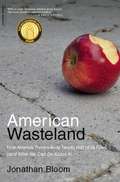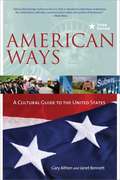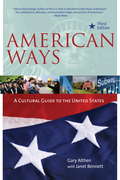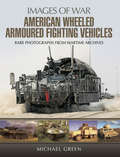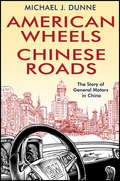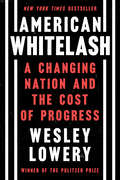- Table View
- List View
American Voyeur: Dispatches from the Far Reaches of Modern Life
by Benoit Denizet-LewisBENOIT DENIZET-LEWIS, one of the most perceptive and interesting journalists writing today, takes us into some unusual precincts of American society in American Voyeur. Denizet-Lewis made news with his New York Times Magazine cover story "Double Lives on the Down Low," included here, which ignited a firestorm by revealing a subculture of African-American men who have sex with other men but who don't consider themselves gay. In American Voyeur, he also takes us inside a summer camp for pro-life teenagers, a New Hampshire town where two young brothers committed suicide, a social group for lipstick lesbians, a middle school where a girl secretly lives as a boy, a college where fraternity boys face the daunting prospect of sobriety, a state where legally married young gay men are turning out to be more like their parents than anyone might have suspected, a high school where dating has been replaced by "hooking up," and other intersections of youth culture and sexuality. Peer behind the curtain of modern American life with this remarkable collection.
American War Plans 1945-1950
by Steven T. RossIn late 1945, it became clear that the Soviet Union was an aggressive power. American military planners began to develop strategies to deal with the frightening possibility of a war with the Soviet Union. This work examines those plans.
American War Plans, 1890-1939
by Steven T. RossBy the close of the 19th century, the United States was no longer a continental power, but had become a nation with interests that spanned the globe from the Caribbean to China. Consequently, the country faced a new set of strategic concerns, ranging from enforcing the Monroe Doctrine to defending the Philippines.As a result of the United States' new geostrategic environment, the armed services had to establish a system for the creation of war plans to defend the country's interests against possible foreign aggression. A Joint Army and Navy Board, established in 1903, ordered the creation of war plans to deal with real and potential threats to American security. Each major country was assigned a colour: Germany was Black, Great Britain Red, Japan Orange, Mexico Green and China Yellow. War plans were then devised in case Washington decided to use force against these or other powers.
American War Plans, 1941-1945: The Test of Battle
by Steven RossThis is an examination of major American and Anglo-American war plans. Rather than discuss the history of planning, Ross considers the execution of the plans, compares the execution with the expectations of the planners and attempts to explain the differences.
American War Stories (War Culture)
by Brenda M. BoyleAmerican War Stories asks readers to contemplate what traditionally constitutes a “war story” and how that constitution obscures the normalization of militarism in American culture. The book claims the traditionally narrow scope of “war story,” as by a combatant about his wartime experience, compartmentalizes war, casting armed violence as distinct from everyday American life. Broadening “war story” beyond the specific genres of war narratives such as “war films,” “war fiction,” or “war memoirs,” American War Stories exposes how ingrained militarism is in everyday American life, a condition that challenges the very democratic principles the United States is touted as exemplifying.
American War of Independence Commanders
by Richard Hook Rene ChartrandThe commanders who led the opposing armies of the American War of Independence (1775-1783) came from remarkably different backgrounds. They included not only men from Britain and America, but from Germany, France and Spain as well. Some were from the great families of the "Old World," while others were frontiersmen or farmers in the "New World." Despite their differing origins, all were leaders in the events that led to the establishment of the United States of America. This book details the appearance, careers and personalities of the commanders on both sides. It covers such famous figures as George Washington and Lord Cornwallis along with less well-known men such as Admiral Suffren and Bernando de Galvez.
American Warlord
by Johnny DwyerChucky Taylor is the American son of the infamous African dictator Charles Taylor. Raised by his mother in the Florida suburbs, at the age of 17 he followed his father to Liberia, where he ended up leading a murderous militia. Chucky is now in a federal penitentiary, the only American ever convicted of torture. This shocking and essential work of reportage tells his tragic and terrifying story for the first time.From the Hardcover edition.
American Warlords: How Roosevelt's High Command Led America to Victory in World War II
by Jonathan W. JordanFrom New York Times bestselling author Jonathan W. Jordan--author of Brothers, Rivals, Victors--comes the intimate true story of President Franklin Roosevelt's inner circle of military leadership, the team of rivals who shaped World War II and America. After the attack on Pearl Harbor, the United States was wakened from its slumber of isolationism. To help him steer the nation through the coming war, President Franklin Roosevelt turned to the greatest "team of rivals" since the days of Lincoln: Secretary of War Henry Stimson, Admiral Ernest J. King, and General George C. Marshall. Together, these four men led the nation through history's most devastating conflict and ushered in a new era of unprecedented American influence, all while forced to overcome the profound personal and political differences which divided them. A startling and intimate reassessment of U.S. leadership during World War II, American Warlords is a remarkable glimpse behind the curtain of presidential power.From the Trade Paperback edition.ed America from isolation to the summit of global power. Written in a robust, engaging style, author Jonathan W. Jordan offers a vivid portrait of four extraordinary Americans in the eye of war's hurricane.
American Warrior: The True Story of A Legendary Ranger
by David Fisher Gary O'NealThe epic story of one of America's greatest soldiers, Ranger Hall of Fame member Gary O'Neal, who served his country for forty years Chief Warrant Officer Gary O'Neal is no ordinary soldier. For nearly forty years, he has fought America's enemies, becoming one of the greatest Warriors this nation has ever known. Part Native American, O'Neal was trained in both military combat and the ways of his native people, combining his commitment to freedom with his respect for the enemy, his technical fighting skills with his fierce warrior spirit. From his first tour in Vietnam at seventeen to fighting in both Gulf wars, O'Neal was nothing less than a super soldier. A minefield of aggression bordering on a justice-seeking vigilante, O'Neal kept fighting even when wounded, refusing to surrender in the face of nine serious injuries and being left more than once. O'Neal earned countless military honors as a member of the elite Army Rangers corps, a founding member of the legendary first Department of Defense antiterrorist team, a member of the Golden Knights Parachuting Team, and more, devoting his life to training the next generation of soldiers. His unbelievable true stories are both shocking and moving, a reminder of what it means to be a true American hero.
American Warrior: The True Story of a Legendary Ranger
by David Fisher Gary O'NealThe epic story of one of America's greatest soldiers, Ranger Hall of Fame member Gary O'Neal, who served his country for forty yearsChief Warrant Officer Gary O'Neal is no ordinary soldier. For nearly forty years, he has fought America's enemies, becoming one of the greatest Warriors this nation has ever known. Part Native American, O'Neal was trained in both military combat and the ways of his native people, combining his commitment to freedom with his respect for the enemy, his technical fighting skills with his fierce warrior spirit.From his first tour in Vietnam at seventeen to fighting in both Gulf wars, O'Neal was nothing less than a super soldier. A minefield of aggression bordering on a justice-seeking vigilante, O'Neal kept fighting even when wounded, refusing to surrender in the face of nine serious injuries and being left more than once. O'Neal earned countless military honors as a member of the elite Army Rangers corps, a founding member of the legendary first Department of Defense antiterrorist team, a member of the Golden Knights Parachuting Team, and more, devoting his life to training the next generation of soldiers. His unbelievable true stories are both shocking and moving, a reminder of what it means to be a true American hero.In O'Neal's own words, he "wasn't born a warrior"—life made him one. American Warrior will serve as inspiration for American men and women in uniform today, as well as appeal to the countless veterans who served their country alongside O'Neal.
American Warsaw: The Rise, Fall, and Rebirth of Polish Chicago
by Dominic A. PacygaEvery May, a sea of 250,000 people decked out in red and white head to Chicago’s Loop to celebrate the Polish Constitution Day Parade. In the city, you can tune in to not one but four different Polish-language radio stations or jam out to the Polkaholics. You can have lunch at pierogi food trucks or pick up pączkis at the grocery store. And if you’re lucky, you get to take off work for Casimir Pulaski Day. For more than a century, Chicago has been home to one of the largest Polish populations outside of Poland, and the group has had enormous influence on the city’s culture and politics. Yet, until now, there has not been a comprehensive history of the Chicago Polonia. With American Warsaw, award-winning historian and Polish American Dominic A. Pacyga chronicles more than a century of immigration, and later emigration back to Poland, showing how the community has continually redefined what it means to be Polish in Chicago. He takes us from the Civil War era until today, focusing on how three major waves of immigrants, refugees, and fortune seekers shaped and then redefined the Polonia. Pacyga also traces the movement of Polish immigrants from the peasantry to the middle class and from urban working-class districts dominated by major industries to suburbia. He documents Polish Chicago’s alignments and divisions: with other Chicago ethnic groups; with the Catholic Church; with unions, politicians, and city hall; and even among its own members. And he explores the ever-shifting sense of Polskość, or “Polishness.” Today Chicago is slowly being eclipsed by other Polish immigrant centers, but it remains a vibrant—and sometimes contentious—heart of the Polish American experience. American Warsaw is a sweeping story that expertly depicts a people who are deeply connected to their historical home and, at the same time, fiercely proud of their adopted city. As Pacyga writes, “While we were Americans, we also considered ourselves to be Poles. In that strange Chicago ethnic way, there was no real difference between the two.”
American Wasteland
by Jonathan BloomThe "Traffic" and "Affluenza" of food waste: an eye-opening account of our culture of excess and waste?and what we can do to change it
American Wasteland: How America Throws Away Nearly Half of Its Food (and What We Can Do About It)
by Jonathan BloomThe Traffic and Affluenza of food waste: an eye-opening account of our culture of excess and waste--and what we can do to change it
American Water Spaniel
by Paul R. MorrisonA Yankee Doodle original, the American Water Spaniel hails from the state of Wisconsin, where in the town of New London Dr. F. J. Pfeifer developed this all-around sporting dog that could retrieve and flush for the upland hunter. Medium in size and colored in chocolate or liver, the American Water Spaniel excels as both a retriever and a spaniel. Author Paul R. Morrison, an active AWS breeder and sportsman, traces the breed's origins back to Civil War days, chronicling the many legends that have evolved about this curly-coated field spaniel. A friendlier, smarter hunting companion cannot be found-the AWS remains one of America's best kept secrets. This Special Limited Edition also discusses the breed's characteristics as a family dog and hunting dog, his personality and abilities and the breed standard. Each chapter is illustrated with color photographs, making this volume as handsome as it is comprehensive and useful. Chapters on selecting a breeder and puppy, rearing and training the puppy, grooming, feeding and much more provide the owner with a complete guide to this fun-loving spaniel. The book also provides an excellent introduction to dog showing and trialing, sports that welcome enthusiastic newcomers on a weekendly basis. A special chapter on preventive healthcare, written by renowned veterinarian Dr. Lowell Ackerman, provides up-to-date, accurate information on inoculations, parasites, spaying/neutering and much more.
American Ways, Third Edition: A Cultural Guide To
by Gary Althen Janet BennettWhether you're a businessperson beginning to work in the United States or a foreign student visiting for a semester, American Ways will help you navigate the diverse and changing culture of the United States. From the deep-seated attitudes that mark the American character to customs and everyday activities, Gary Althen and Janet Bennett provide invaluable information on religion, politics, education, and relationships.
American Ways: A Cultural Guide to the United States of America
by Gary Althen Janet BennettWhether you're a businessperson beginning to work in the United States or a foreign student visiting for a semester, this new edition of American Ways will help you navigate America's diverse and changing culture. From the deep-seated attitudes that mark the American character to customs and everyday activities, American Ways explores the tapestry of the country's life, providing invaluable information on cultural values, politics, education, religion, and relationships. In this revised edition, Gary Althen and Janet Bennett have added material that reflects some of the important changes that have occurred over the last decade. This edition features new material on American politics, reflecting the impact of the Bush administration as well as the election of the nation's first black president, and an updated chapter on the effects of social networking sites on meeting people and creating friendships.
American Ways: An Introduction to American Culture (Fourth Edition)
by Edward N. Kearny Maryanne Kearny Datesman Joann CrandallAs the cultural diversity of the United States continues to increase, the issues surrounding multiculturalism continue to be of great importance. With updates throughout and a fresh, new design, retains its values-based perspective in examining what makes the U.S. unique -- and how traditional values influence various aspects of American life such as religion, business, government, race relations, education, recreation, and family.
American Well: The DTC Decision
by Natalie Kindred Elie OfekIn late 2013, telehealth company American Well, which developed a digital platform that allowed patients to conduct online medical consultations with physicians, is considering pursuing a direct-to-consumer (DTC) strategy. Founded in 2006, American Well had, to date, primarily sold its solution to health plans, which then provided online care services to their members using their own brand name. But while American Well attracted some of the largest U.S. health insurers as clients, a surprisingly small number of individual members had actually used the online care service. American Well management believed low consumer awareness-the result of insufficient marketing by health plans, among other factors-was hampering uptake of what should be a highly valuable offering for all stakeholders involved. They wondered if a DTC approach, in which American Well would become a consumer brand and market a telehealth service directly to the public, for example through a mobile app, could drive utilization and catapult the business to the next level. If a DTC offering were given the green light, the company had to come up with a coherent marketing plan to launch it and figure out how to manage potential conflicts with existing clients, who might view the move as competing with their own telehealth efforts. Moreover, the move had to be considered in light of other initiatives the company had recently embarked on, such as marketing its platform to pharmacy chains, targeting large employers, and selling kiosks that provided a physical space to conduct online consultations. The case forces students to grapple with the challenges and barriers involved in disrupting an established industry, examine alternative go-to-market strategies and the timing of implementing them, and consider different business models to manage supply and generate revenues. The case also offers a rich analysis of digital marketing issues.
American Well: The Doctor Will E-See You Now
by Elie Ofek Ron LauferWhat is next for healthcare IT provider American Well, whose innovative Online Care technology allows physicians to deliver care to patients online in real time? Using American Well's platform, patients with non-emergency health concerns can communicate with physicians online or by phone and receive advice or even a diagnosis without having to visit the physician's office. American Well's co-founders, Ido Schoenberg and Roy Schoenberg, believe this platform will reduce the cost of care delivery; create new revenue-earning opportunities for providers; and contribute to a more efficient, convenient healthcare delivery system. While the platform could benefit insurers, providers, employers, and patients alike, the company has only marketed to a few health insurance companies to date. In November 2009, 3 insurers have adopted the technology, and American Well expects several more to do so over the next 12 months. As the company plans to accelerate adoption by health insurers, it is also considering other growth options. Is it too early to commit resources to developing and marketing American Well's second-generation product, which facilitates real-time connectivity between primary care physicians and specialists? Should American Well pursue new markets in the U.S., such as hospitals, chains of clinics, and pharmacies, or even expand internationally? In a broader sense, American Well's technology solves the economic obstacle of time and place by connecting excess supply (of physician capacity) with excess demand (for patient care). Could this model be adapted to other industries, such as legal and accounting services? Alternatively, should American Well continue to focus solely on its primary product and on becoming the leader in the Online Care Industry?
American Wheeled Armoured Fighting Vehicles (Images Of War Ser.)
by Michael GreenNumerous wheeled armoured fighting vehicles have seen service in the US armed forces on and off for over 80 years.There have been various changes of policy and twice, after the Second World War and Vietnam, they went out of favour but their use is now well established.This well researched and superbly illustrated book describes all the different types and variants since the first M1 was ordered in 1931. The M8 armoured car was widely used during World War Two but it was not until Vietnam that further wheeled AFVs came into service, notably the M706 armoured car.After a lull the US Marine Corps adopted the Light Armoured Vehicle (LAV) in 1983. The US Army first used armoured Humvees in 1994 and variants remain in service (M1141 and M1116). Other types today include the Guardian (M1117) and the Army version of the LAV names the Stryker. To meet the operational requirements of Iraq and Afghanistan the Mine Resistant Ambush Protected vehicle (MRAP) was ordered in bulk from 2007.
American Wheels, Chinese Roads: The Story of General Motors in China
by Michael J. DunneHow could one company—General Motors—meet disaster on one continent and achieve explosive growth on another at the very same time? While General Motors was hurtling towards bankruptcy in 2009, GM’s subsidiary in China was setting new sales and profit records. This book reveals how extraordinary people, remarkable decisions and surprising breaks made triumph in China possible for General Motors. It also shows just how vulnerable that winning track record remains. No small part of GM’s success in China springs from its management of shifting business and political relationships. In China, the government makes the rules for—and competes in—the auto industry. GM’s business partner, the City of Shanghai, is both an ally and a competitor. How does such an unnatural relationship work on a day-to-day basis? Where will it go on the future? General Motors also engages in constant battles with other global and Chinese car makers for the hearts of demanding Chinese consumers. Dunne gives us rare glimpses into the mindsets and behavior of this new moneyed set, the worlds newest class of wealthy consumers. China is already the number one car market in the world. During the next ten years, China will export millions of cars and trucks globally, including to the United States. American Wheels, Chinese Roads presents readers with fascinating illustrations of what to expect when Chinese cars, companies, and business people arrive on our shores.
American Whitelash: A Changing Nation and the Cost of Progress
by Wesley LoweryNEW YORK TIMES BESTSELLERAn NPR Best Book of the Year • Kirkus Reviews Best Book of the YearLonglisted for the 2024 Andrew Carnegie Medal for Excellence“American Whitelash is indispensable. Really. It is.” – Ibram X. Kendi, author of How to Be an AntiracistPulitzer Prize–winning journalist Wesley Lowery confronts the sickness at the heart of American society: the cyclical pattern of violence that has marred every moment of racial progress in this country, and whose bloodshed began anew following Obama’s 2008 election.In 2008, Barack Obama’s historic victory was heralded as a turning point for the country. And so it would be—just not in the way that most Americans hoped. The election of the nation’s first Black president fanned long-burning embers of white supremacy, igniting a new and frightening phase in a historical American cycle of racial progress and white backlash.In American Whitelash, Pulitzer Prize–winning journalist and best-selling author Wesley Lowery charts the return of this blood-stained trend, showing how the forces of white power retaliated against Obama’s victory—and both profited from, and helped to propel, the rise of Donald Trump. Interweaving deep historical analysis with gripping firsthand reporting on both victims and perpetrators of violence, Lowery uncovers how this vicious cycle is carrying us into ever more perilous territory, how the federal government has failed to intervene, and how we still might find a route of escape.
American Wife
by Jim Defelice Taya KyleThe widow of "American Sniper" Chris Kyle shares their private story: an unforgettable testament to the power of love and faith in the face of war and unimaginable loss--and a moving tribute to a man whose true heroism ran even deeper than the legend In early 2013, Taya Kyle and her husband, Chris, were the happiest they ever had been. Their decade-long marriage had survived years of war that took Chris, a U.S. Navy SEAL, away from Taya and their two children for agonizingly long stretches while he put his life on the line in many major battles of the Iraq War. After struggling to readjust to life out of the military, Chris had found new purpose in redirecting his lifelong dedication to service toward supporting veterans and their families. Their love had deepened, and their family was whole, finally.Then, the unthinkable. On February 2, 2013, Chris and his friend Chad Littlefield were killed while attempting to help a troubled vet. The life Chris and Taya fought so hard to build was shattered. In an instant, Taya became a single parent of two. A widow. A young woman facing the rest of her life without the man she loved.Chris and Taya's remarkable story has captivated millions through Clint Eastwood's blockbuster Academy Award-winning film American Sniper, starring Bradley Cooper as Chris and Sienna Miller as Taya, and because of Chris's bestselling memoir, in which Taya contributed passages that formed the book's emotional core. Now, with trusted collaborator Jim DeFelice, Taya writes in never-before-told detail about the hours, days, and months after Chris's shocking death when grief threatened to overwhelm her.And yet throughout, friendship, family, and a deepening faith were lifelines that sustained her and the kids when the sorrow became too much. Two years after her husband's tragic death, Taya has found renewed meaning and connection to Chris by advancing their shared mission of "serving those who serve others,"particularly military and first-responder families. She and the children are now embracing a new future, one that honors the past but also looks forward with hope, gratitude, and joy.American Wife is one of the most remarkable memoirs of the year--a universal chronicle of love and heartbreak, service and sacrifice, faith and purpose that will inspire every reader.
American Wilderness: Alaska and the National Parks (1865-1890) (How America Became America)
by Wesley WindsorAlaska--America's forty-ninth state--has a long and rich history. Beginning with the Native people who first made their homes there, the inhabitants have benefited from Alaska's bountiful resources. Alaska's gold, fish, and lumber have all contributed to America's economy. Some people wonder, however, if Alaska's greatest natural resource might be her untouched wilderness areas. Our National Parks are another one of our great resources. How should land be used? To whom does it belong? Who should decide? Questions like these have played a major role in shaping the United States--and they continue to do so today. America's National Parks are just one answer to these questions.
American Will
by Bobby JindalGovernor Bobby Jindal of Louisiana, a much-talked-about 2016 presidential candidate, offers fourteen lessons from our nation's past and discusses how they can be used to restore American courage, faith, and wisdom.Nearly forty-five years ago, Bobby Jindal's parents left their home in rural India--a place with no electricity or running water--to build a new life in the United States. Every day, Jindal's father told him, "You should be grateful that you were blessed to be born in the greatest country in the history of the world"--a country where the son of poor immigrants could grow up to become the governor of Louisiana. For Jindal, this defining experience bolsters a profound belief in American exceptionalism: Freedom is not just the American way, it's the American will. As we approach the next great turning point in this extraordinary nation's remarkable history, Jindal brings to life inspiring stories from our country's past that have influenced his beliefs and the indispensable lessons each can teach us about our future. Stories such as the stalwart senator who galvanized the public against Hillary Clinton's costly and oppressive socialist health-care proposal in the early 1990s; the entrepreneur whose dogged determination ushered in a worldwide energy revolution, and with it technological innovation and economic growth; and the Founding Father who refused to "lead from behind" and instead used his vision for the nascent nation's vast potential and the best interests of its people to outwit a greedy dictator. In the next election, we can continue down the current destructive path of big government, emboldened enemies, diminished liberties, and hostility to religious faith. Or we can embrace the values that have always propelled America to the top: limited government; free people and free markets; strength and exceptionalism; and the essential role of religious faith in effecting change. American power is precious, and our vital interests and those of our allies depend on strong leadership. Whom will we choose: a cynic or a statesman, a politician or a problem solver? The dramatic tales in American Will illuminate the courage, faith, and vision that we need in 2016--and the government folly, corruption, and myopia that jeopardize our future.












